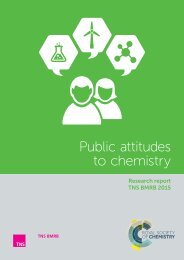JADE
1Plf2Lt
1Plf2Lt
You also want an ePaper? Increase the reach of your titles
YUMPU automatically turns print PDFs into web optimized ePapers that Google loves.
4 | <strong>JADE</strong><br />
EDITORIAL | 5<br />
FORWARD<br />
EDITORIAL<br />
W<br />
elcome to <strong>JADE</strong>. <strong>JADE</strong> was launched<br />
two years ago by the Learning and<br />
Professional Development Centre. The<br />
journal was developed as a space to share<br />
practice for Keele staff and students that<br />
wished to write about their educational experiences<br />
as part of their scholarly practice. It was established<br />
to publish reflections on and inquiries into the acts of<br />
learning and teaching and to disseminate that work. Staff<br />
and students at Keele University act as writers, readers,<br />
reviewers, editors; and perhaps most importantly as<br />
learners and collaborators in the endeavour to improve<br />
student learning experiences and outcomes through their<br />
contributions to <strong>JADE</strong>.<br />
<strong>JADE</strong> celebrates teaching scholarship, an act I have<br />
previously described as a journey of discovery and<br />
personal growth, and makes teaching scholarship public –<br />
open to scrutiny and sharing with interested others. Over<br />
the past two years, the readership of <strong>JADE</strong> has grown and<br />
broadened to include colleagues beyond Keele, and in<br />
2015, we took two decisions that will further support <strong>JADE</strong><br />
to grow and flourish. First, we have decided to accept<br />
submissions for published articles from staff or student<br />
members of other Universities and to publish these if<br />
they are deemed to be interest to our Keele and wider<br />
readership. In making this decision, we have expanded the<br />
potential community of scholars that can contribute to<br />
<strong>JADE</strong>’s future but hold steadfast the desire to sustain the<br />
journal as a place for scholarly discovery of both staff and<br />
students. Second, in support of encouraging submissions<br />
from student scholars, we also took the decision in 2015,<br />
to appoint a student Associate Editor to solicit for and<br />
encourage student contributions.<br />
<strong>JADE</strong> continues to be a space that models innovation and<br />
creativity in the scholarship of teaching and learning. I<br />
sincerely hope you enjoy your experience of contributing<br />
to <strong>JADE</strong>, as a writer, reader, reviewer or editor, and as a<br />
learner and collaborator in scholarly endeavour.<br />
Dr. Jackie Potter<br />
Head of the Learning and Professional Development Centre<br />
“is it realistic<br />
to expect<br />
that systemic<br />
change at the<br />
institutional or<br />
even national<br />
level can be<br />
brought about<br />
by interventions<br />
aimed at<br />
individuals”.<br />
Prof. Paul Trowler<br />
Policy Sociologist<br />
Prof. Trowler is best known for his work on Academic Tribes and<br />
Territories. However his interests range across many areas of<br />
higher education, both substantive and methodological. These<br />
are detailed at http://www.lancaster.ac.uk/educational-research/<br />
about-us/people/paul-trowler<br />
He is a policy sociologist, and applies that analytical lens across domains<br />
of research and evaluation which broadly concern policy production and<br />
enactment in different higher education contexts. Prof. Trowler works<br />
with an eye to making a difference: ‘enhancement’ is a watchword that<br />
guides his work. He has advised institutional leaders, higher education<br />
organisations and change agents in higher education around the world<br />
for many years. In this editorial, Prof. Trowler tells us about his recent<br />
visit to Keele by invitation from The Higher education Network Keele<br />
(THiNK) group (https://www.keele.ac.uk/lpdc/research/think/).<br />
RESEARCHING FOR ENHANCEMENT IN<br />
HIGHER EDUCATION:<br />
BEYOND STRUCTURALISM AND<br />
INDIVIDUALSIM<br />
In October I gave a talk to staff at Keele entitled Researching<br />
for enhancement in higher education: Beyond structuralism and<br />
individualism. What I wanted to do in the talk was to show how initiatives<br />
to enhance learning and teaching often focus on changing the attitudes,<br />
behaviours and choices of individual teachers. Where such attempts<br />
are underpinned by research, the research is also usually focused at the<br />
individual level. Clearly, individuals do make choices and can change<br />
their own behaviour, but realistically this should be seen as happening<br />
within the context of social practices: recurrent sets of practices in small<br />
social groups underpinned by emotions, assumptions and knowledge<br />
resources.<br />
My talk therefore set out a picture of higher education contexts<br />
consisting of multiple sets of social practices in play, enmeshed with<br />
other social practices which sometimes had different, contradictory or<br />
even antagonistic purposes. This picture highlights the fact that contexts<br />
shape and sometimes limit the options of individuals themselves and so<br />
change initiatives need to recognise this and be pitched at the practice<br />
level and the way social practices mesh.




